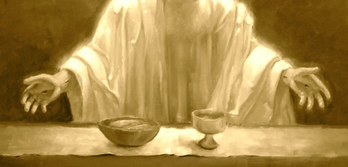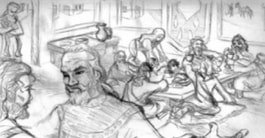 Here's the rub: it's not just simply believing in your heart that God raised Jesus from the dead and confessing that Jesus is Lord, but with whom you are believing and confessing together with that matters. There is a remarkable interchange between Aslan and one of the children getting ready to embark on a dangerous, yet important journey. In C.S. Lewis’ The Silver Chair, Aslan, the Christ-like figure in the story, is speaking rather seriously to Jill. It was important, crucial for her to remember these signs that will guide her on her perilous quest to rescue the Prince Rilian. She must cling to Aslan’s words and follow the signs that he gave her: . . . first, remember, remember, remember the signs. Say them to yourself when you wake in the morning and when you lie down at night, and when you wake in the middle of the night. And whatever strange things may happen to you, let nothing turn your mind from following the signs. And secondly, I give you a warning. Here on the mountain I have spoken to you clearly: I will not often do so down in Narnia. Here on the mountain, the air is clear and your mind is clear; as you drop down into Narnia, the air will thicken. Take great care that it does not confuse your mind. And the signs which you have learned here will not look at all as you expect them to look, when you meet them there. That is why it is so important to know them by heart and pay no attention to appearances. Remember the signs and believe the signs. Nothing else matters. Remember the signs. True, our text, Romans 10:5-13, is not explicitly about signs . . . but it is, actually, in the two marks of faith, signs if you will, that are given: believing and confessing. Signs that signify! My parallel in using Aslan’s words to Jill in Lewis’ The Silver Chair also isn’t apparent . . . so let me explain before we get to the text itself. First, believing and confessing are indeed the marks (signs) of a believing community and these signs are true and should be true of the house-churches in Rome:
These are the two signs—they are clear on the mountain top (that is, in theology and, perhaps, in our belief systems), but they won’t be so clear in the thick air of the valley (in the mundane and crises of life). The two signs: believing God raised Jesus from the dead and confessing that Jesus is Lord. Sounds so easy. So simple. Especially while we are living and breathing in a nation and within a place and time when church seems so normal, ordinary, and natural, and pretty easily defined. But, actually, not so much. Certainly not so easy in that first setting, the city capital of the world, Rome. Believing that God raised that traitor—that man who was crucified on that Roman cross. Being raised from the dead was incredibly naïve and ridiculously dangerous in an Empire where people stayed dead once they were declared guilty of treason and put to open shame on a Roman cross. And, confessing this One raised from the dead—confessing out-loud, in public setting like a supper, in the lifting of that fourth cup at that supper meal—that Jesus is Lord is not only scandalous, it was treason against Caesar (for he was to be confessed as Lord). This believing and confessing was dangerous—and if you didn’t see this and hear this believing and confessing happening, well, it wasn’t church. It wasn’t a church at all. This is one certain place where the Christian life cannot, biblically, be lived apart from a local, concrete, embodied group of believers--a church. A “confessing” Christian simply cannot confess apart from others, others who are seated around that table. In fact, there is no believing without confessing and there is no confessing without being a part of a local, concrete body of believers--a local gathering, a church. We are believing, not as individuals, not as disembodied, church-less Christians, but as confessing Christians, together confessing that Jesus is Lord . . . and who is around this table, that is, who is supposed to be around that table? Paul's list: the elite-Greek, Barbarian, Jew, the educated and the uneducated . . . this is Paul’s point to the house-churches in Rome (cf. Romans 1:14-15)—this is Paul’s point to us in Romans 10:9-13: because, if you confess with your mouth that Jesus is Lord and believe in your heart that God raised him from the dead, you will be saved. For with the heart one believes and is justified, and with the mouth one confesses and is saved. For the Scripture says, “Everyone who believes in him will not be put to shame.” For there is no distinction between Jew and Greek; for the same Lord is Lord of all, bestowing his riches on all who call on him. For “everyone who calls on the name of the Lord will be saved.” Why is there no distinction between Jew and Greek? Why is there no distinction between the Jew and the elite-Greek, the barbarian, the educated and the uneducated (cf. Romans 1:14), because God’s solution to our sin is not out of reach for anyone. Why is it found in our believing that God raised Jesus from the dead and by us confessing that Jesus is Lord . . . why? . . . because “everyone who calls on the name of the Lord will be saved.” Everyone—the elite-Greek, barbarian, Jew, the educated and uneducated. (Feel free to translate that string into today’s population, social, and cultural, dividing, and separated demographics.) While we often use this text—and the next regarding sending preachers (10:14ff.)—as “witnessing” texts, evangelizing texts, they are not used in this way here in Romans 10 nor are they used for the house-churches in Rome to evangelize; but to help promote unity among the house-churches in Rome . . . how so? First, the unwelcomeness (Romans 14-15) among the house-churches in Rome between classes of people (social and cultural), it disavowed, negated what Paul has written about, namely, that “everyone who calls on the name of the Lord will be saved” We, too often, gather in worship together like NOT EVERYONE who calls upon the name of the Lord will be saved . . . it looks like, in our gathering as church, in our supper-room, around the table, that only “our kind,” only our friends and peers, only those in our political party, only those we’d want our children to marry, only those on this side of the rail-road tracks (as it were), this side of town . . . only these are the “who call upon the name of the Lord who will be saved.” This is the context and purpose of Romans, and is a fair and appropriate reading of the significance of Paul’s words concerning “believing” and “confessing.” The early church would not have had to fence the table and, in fact, we do not see them doing that amid the New Testament testimony. Strangely, most of the supper-rooms where the first Christians gathered would have been public or at least semi-public where outsiders could see and hear what was happening, and see who was sitting next to whom . . . and, thus, to participate in the Lord’s supper, surrounded at that table by fellow-Jesus-followers from differing classes, genders, age groups, slaves and masters, even children would have been crazy unless one actually believed that God raised Jesus from the dead; for you were confessing with these strangers and unequals that Jesus, not Caesar, was Lord. This crazy mixed company of peoples, believing and confessing together was the sign that it was all true—the gospel and the church were all true.
0 Comments
The goal of redemptive history is the cosmic restoration of creation. This is the story of the Bible. This is the church’s story. This should be your church's story. God has determined to use a redeemed people to herald this message. The ekklesia of Jesus, the gathered-church, composed of redeemed and restored people, living out the gospel, illustrating this cosmic restoration through its treasonous worship of the risen Jesus, the Lord over all other claims to the throne, its missional behavior to its neighbors, and , particularly, through the fellowship of restored human relationships among strangers and unequals. The gathered-church of the Lamb of God is unlike any and all other rebellions and resistance movements: church is not (ever) aligned with a government or party or state or king in order to violently overthrow or by means of State-authority and any form of violence to maintain; church is never (ever) aligned with the spilling of blood through strength or cunning to change or maintain the status quo of an unredeemed social structure or cultural state of affairs; and, where privileged to participate, church does not count on the ballot-box to overthrow power or maintain a particular person or party in power. The church uses a table of fellowship over food, broken bread, and a raised cup of allegiance to the risen King of kings and Lord of lords, now seated at the right hand of God in the heavenly places. This has been and is God’s way of, not saving the State or some preferred demographic or cultural value, but demonstrating that all of history is moving toward His ultimate conclusion of a restored creation. How does God reveal and accomplish this purpose of history? Little and grand tables, scattered throughout time and place, some well noticed and many hidden in the back alleys and among the margins–this has been where God does his rewriting of corrupted history and the deconstructing of the powers of humankind. This is church-story. Not just the best story. But the true story of history. This is the story you and I are invited into; and, the gathered-church is the place God restores all things. Not the battlefield. Not the ballot box. But at tables of strangers and unequals.
When Jesus called his disciples to “follow me and I will make you become fishers of men” (Mark 1:17), most assume a positive evangelistic outcome of reaching people for Christ. Nothing could be further from the reality behind Jesus’ intentions in calling out followers to be such witnessing-fishers. At least the benign, banal application of making this verse a proof-text for “witnessing” is a shallow and narrow application of Jesus’ powerful imagery cast in this tremendous text.
Tax collectors are outsiders; rich they might have been, but they were in the eyes of temple leadership, traitors to God and to God’s people. Yet, the sinners are most certainly the uneducated serfs and peasants, farmers, and those who lived on the margins of life in and around Jesus’ house in Capernaum of Galilee (2:15). One cannot spin from this text a general characteristic that “sinners” are all sinners anywhere you find them. As are the "tax collectors," they are a specific demographic associated with those living as the poor and marginal of Jesus’ day. Jesus’ response, then, takes on an ominous shadow—a fisher shadow, standing on the shore, cast into the waters of those that are "healthy." True fisher-followers of Jesus will not rationalize their standing in the community nor their affluence, but will count their privilege, their advantage, at the disposal of the “sick” who need a physician. Paul is not far from the same imagery when he describes how Jesus took his advantage (his privilege) and gave it all on behalf of all those with the greatest of disadvantage. Have this attitude in yourselves which was also in Christ Jesus, who, although He existed in the form of God, did not regard equality with God a thing to be grasped, but emptied Himself, taking the form of a bond-servant, and being made in the likeness of men. Being found in appearance as a man, He humbled Himself by becoming obedient to the point of death, even death on a cross (Phil 2:5-8). Most likely Amos 4:1-2 is one of the underpinning Old Testament referents that would have given the disciples a frame, a rather menacing edge, for understanding the potency of Jesus’ call on their lives. In view of the inclusion (contextually) of Amos 4:1, namely the “cows of Bashan” referent, I have become wary of the poorly distributed resources, talents, and wealth among the richer, more affluent churches at the expense of the poorer churches, neighborhoods, and urban mission fields. By “expense” I am thinking biblically, not culturally, socially or (heaven forbid) politically, nor through the lens of class, but by the very New Testament discipleship implications, namely that those with advantages (“privilege,” if I may) who are called by their association with Jesus to help those who are at a disadvantage. The assumption that it takes more money to reach the rich and affluent than the poor is turned on its head by the very presence of the Kingdom (cf. Mark 1:17 with Mark 1:14-15). A more gospel-centered and mature view of discipleship seem to argue that it takes far more resources to go into the poor urban fields to bring forth a harvest for the gospel of the kingdom. These are under-resourced communities in every imaginable aspect of life. As affluent Christians, we tend to justify our station in life as a combination of gift and hard work and hear any talk of “privilege” as a justification of those of lesser means, with poorer gifts, and perhaps, with what we perceive, a lesser work ethic to grab what we have for themselves. Is there no wonder the affluent in the days of both Amos and Jesus attempted to rid themselves of the troublemakers who upset the "healthy's" status quo? This will be the lot of fisher-follows of Jesus in any culture. Following Jesus, as the gospel is imagined by Mark (and the other Gospel writers), put us at odds with everything we hold dear, in particular those who have the advantage in resources are to empty themselves on behalf of those who are at a disadvantage (cf. Phil 2). The fisher-follower mission is toward the sick (of our society), not the healthy (in our society)—toward the disadvantaged and not the advantaged. Michael Card prophetically reflects this Marken view of Jesus and the gospel in the words of his song, The Stranger:
For a youtube of Michael Card's "The Stranger" >> Click here *See chapter 3, “‘You Will Appear as Fishers’ (Mark 1:17): Disciples as Agents of Judgment,” in my Wasted Evangelism for a further and more detailed study of the Mark 1:17 “fishers of men” passage.
|
AuthorChip M. Anderson, advocate for biblical social action; pastor of an urban church plant in the Hill neighborhood of New Haven, CT; husband, father, author, former Greek & NT professor; and, 19 years involved with social action. Archives
February 2024
Categories
All
|
Pages |
More Pages |
|


 RSS Feed
RSS Feed